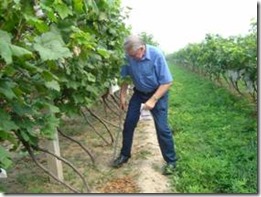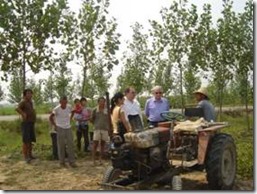CATEGORIES
SEARCH
CONTACT
25 Alderson Rd
Fairview Downs
Hamilton 3214
New Zealand
PH 64-212956469
“Every essential element either in our fertilizer or diet is a contaminant if over supplied.”
— Brian McLeod
Soil Laboratory Kaifeng Xian China
 Bryan inspecting a wheat crop in the Kai Feng Xian Nong Zhu (Kai Feng County Henan Province)
Bryan inspecting a wheat crop in the Kai Feng Xian Nong Zhu (Kai Feng County Henan Province)
Establishing a laboratory and working farmers in China was both challenging and very rewarding.
Firstly we needed to
[1] understand local farming methods
[2] Work with local farmers to gain local knowledge – we did this by choosing one farmer in each of the surrounding villages to work with.
[3] Understand the various crops that were being grown plus any nutritional problems. Crops are Wheat, Corn, Cotton, Peanuts, Soya beans, Water melon, Grapes, Vegetables, Onions, Garlic, Carrots, Rice, Pomegranates, Stone Fruit, Pears, Tomatoes, Pumpkins, Zucchini's, Capsicums and many more.
[4] Establish a plan to work with the farmers we had chosen from each village
[5] Take soil samples for analysis, leaf samples were not taken due to limitations of the lab to do a dry leaf analysis
Farmer Visits: We then visited each farmer every month through the growing season, giving agronomic advice including both soil and foliar nutrient applications.
We would deliver our recommended fertilisers and foliars each month to ensure our program was acted on
During this time we were able to gain the farmers confidence as they were able to see significant improvements in their yields and produce quality
Sharon Clayton from Australian APAL Soil Laboratory Training staff In Kai Feng lab ![clip_image002[5] clip_image002[5]](http://bryanlmcleod.com/wp-content/uploads/2015/06/clip_image0025_thumb.jpg)
Bryan McLeod and business partner Simon Cope discussing soil analysis results with local farmers. Dry corn in the back ground
Inspecting a garlic crop Kaifeng Xian China
Bryan with local farmer inspecting a Soya bean crop
Demonstrating taking soil samples in a vineyard
Discussions with local peanut farmers

![clip_image004[5] clip_image004[5]](http://bryanlmcleod.com/wp-content/uploads/2015/06/clip_image0045_thumb2.jpg)


